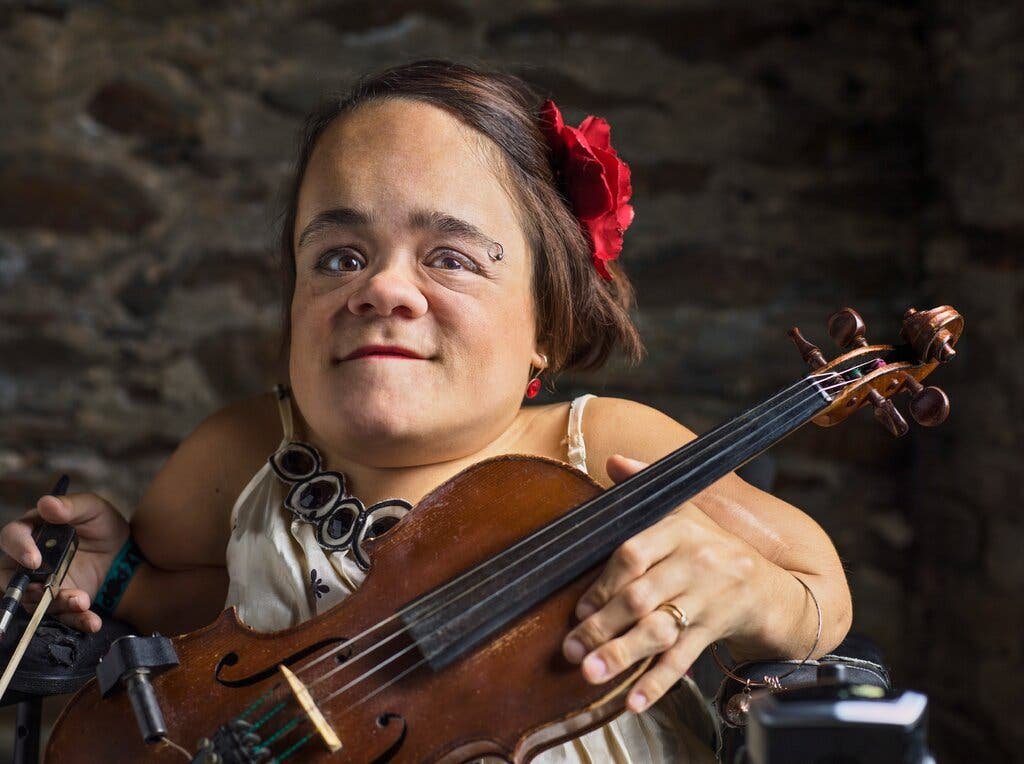RAMPD, an organization of professional disabled musicians, will push for accessibility in the music industry, including adding visible ramps to awards show stages.
The musician Lachi is one of the founders of RAMPD, an organization that works to amplify disability culture and advocate for accessibility in the music business.
For the singer, songwriter and producer Lachi, the acronym was everything.
She helped start the organization that would become RAMPD — Recording Artists and Music Professionals with Disabilities — in July 2021, but it was a few months earlier, after moderating a panel for the Recording Academy about disability inclusion, that she came up with the name.
“After that aired, musicians with disabilities were coming out of the woodwork and following me on Instagram, DMing me going, ‘What are we going to do? Are you going to lead this charge? What’s next?’” Lachi said in an interview. “Everyone was energized. And that’s when the spark came, of the acronym.”
RAMPD, which Lachi co-founded with the singer-songwriter and violinist Gaelynn Lea, alongside a dozen or so founding members, works to amplify disability culture and advocate for accessibility in the music business. One of its main goals, fittingly, is to make accessibility ramps visible on TV during awards shows to help normalize disability in the entertainment industry.
The coalition’s kickoff will be a virtual event at 5 p.m. on Friday, with opening and closing remarks live from the Grammy Museum Experience at the Prudential Center in Newark, N.J. (The Grammy Awards, originally scheduled for Jan. 31, have been pushed back to April 3.) Adrian Anantawan, a classical violinist; Eliza Hull, an indie rock singer-songwriter; and Molly Joyce, an organist and songwriter, will perform, alongside other disabled musicians, and professional membership applications for the group will open.
“Our professional membership have awards, have toured, have worked with big names, are big names themselves,” said Lachi, who is based in New York. “And we’re not here to make folks feel warm and gushy. We’re not here to get handouts. We’re here to get gigs. We’re here to get on stages, we’re here to get paid.”
“Disability isn’t ‘despite this, they did this,’” said the singer-songwriter and violinist Gaelynn Lea, a RAMPD co-founder. “It’s more like, ‘because of their identity as a disabled artist, you are enjoying this art in this form.’” Credit...Paul Vienneau
In October, RAMPD partnered with the inaugural Wavy Awards for an event celebrating women, L.G.B.T.Q. artists, nonbinary musicians, artists of color, performers who identify as having a disability and allies. The organization advised the show on American Sign Language interpretation, captioning, audio description and ensuring the inclusion of people with disabilities on-camera and behind the scenes.
Perhaps Lachi’s favorite part, though, was promoting the use of what she calls “self description,” known widely as visual description, which is added as audio to television programs and movies to help people with low vision and people who are blind, like herself.
“My name is Lachi, she/her, Black girl, cornrows,” she said as an example. “So that’s what I go by. And that’s all it is.”
She underscored how racism, sexism and homophobia compound the discrimination disabled people face. “It’s paramount for folks to recognize that disability has color, that disability has gender, that disability has sexual preference and that disability is not straight, white, middle-America male,” she said.
Lea, who was born with osteogenesis imperfecta and is based in Minnesota, pointed out that she wouldn’t make the same music — which won NPR Music’s Tiny Desk Contest in 2016 — if not for her life experience.
“Disability isn’t ‘despite this, they did this,’” she said in an interview. “It’s more like, ‘because of their identity as a disabled artist, you are enjoying this art in this form.’”
She added, “Disability culture and the movement that we’re starting I think really is actually up there in terms of cultural shifts with all the other diversity movements we’re talking about.”
Through the Arrowhead Regional Arts Council in Duluth, Minn., Lea received the Arts Ecosystem Grant, which will allow RAMPD to build a membership database of professional disabled artists — something that never existed until now. RAMPD also recently secured a fiscal sponsor, Accessible Festivals, a nonprofit organization that will help manage RAMPD’s grants and donations, and allow for the group to grow beyond Lachi and Lea.
“We want to see more leaders emerge out of this and people recognize them in the community, because sometimes it feels like I get asked to do so many events, and it’s partly because I feel like people don’t know anyone else to ask,” Lea said. “That’s something that we have to fix.”


